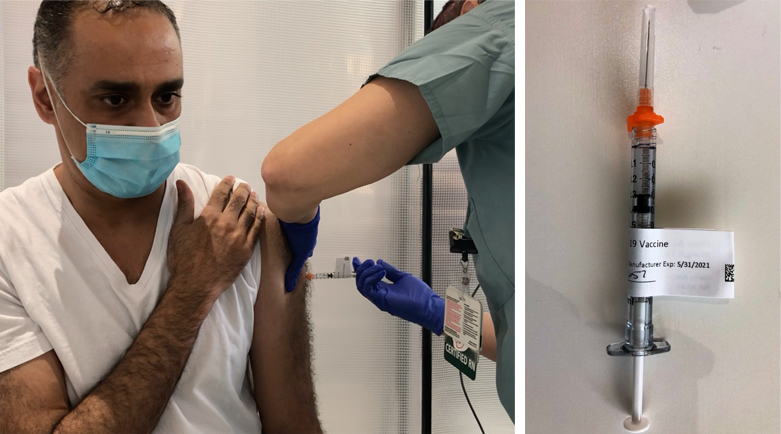Is the COVID-19 vaccine right for you?
As healthcare workers across the U.S. prepare for this unprecedented vaccination effort and agencies begin making the necessary arrangements to allow for the public to have the opportunity to take the vaccine, you may be wondering how you sign up to get your first dose. Quite frankly, you may be asking “how does the vaccine even work” or “is it even safe to take”. To help you determine if the vaccine is right for you, our team would like to share some answers to frequently asked questions during this difficult time.
What does the COVID-19 vaccine do?
The two vaccines currently approved by the FDA for emergency use in the U.S, created by Pfizer and Moderna, contain small amounts of messenger RNA (mRNA) that allow your body to make a harmless protein that resembles that on the outer surface of the virus. When the protein is created and copied, the remaining mRNA and vaccine is destroyed by our bodies. Within a few days, our cells identify the newly formed protein as “foreign” and build T and B-lymphocytes (antibodies) that are designed to attach to invading coronavirus molecules. Ultimately, this attachment blocks the virus from attaching to our own cells, identify it as an invader, and is subsequently destroyed with ease. It is not possible to become infected or infect others by taking the vaccine as there is no live virus in the injection. After vaccination, if you are exposed to COVID-19, your body will be prepared to neutralize and fight it.
Why are there two doses of the vaccine?
The first dose of the vaccine stimulates our bodies to have the initial reaction that allows for the creation of the COVID-protein replicant. Over some time, your body will begin to create the antibodies that can fight off the virus if needed. The second dose is considered a “booster” and allows for the vaccine to have a longer and maximal effect. For example, the Pfizer vaccine was 52% effective after the first dose, but 95% following the second.
What are the common side-effects?
Typically, like the flu shot, common side effects may include soreness around the injection site, headache, and muscle aches. Less commonly, some individuals may feel feverish for a few days following injection or an allergic reaction. If you are allergic or have had anaphylaxis reactions to any ingredient of the vaccine, you should not take that brand of vaccine. Fortunately, any significant reactions are extremely rare, and most people find the vaccine to be well tolerated. Further the risk of serious illness from infection with COVID-19 far outweighs the risk of any significant adverse reaction to the vaccine.
Can I get the vaccine?
Please go to your state’s vaccine information page to keep up to date on when the vaccine will be available to your priority group. In Illinois, for instance, the vaccine is not yet available to the public outside of those over 65. If you fit this criterion, please go to the link below for more information. All populations of Illinois, including those who are undocumented, are encouraged to get the vaccine. Nobody under any circumstance will be turned away when their time comes. If you have already had COVID-19, you are still recommended and encouraged to take the vaccine as, after around 90 days, you may not have the immunity that follows from infection. If you are pregnant or have a weakened immune system, please consult your doctor to determine if taking the vaccine is right for you. The Pfizer and Moderna vaccines are currently not recommended for those under the ages of 16 and 18, respectively, as more research is being done to ensure its safety for children. https://coronavirus.illinois.gov/s/vaccination-location
If I take the vaccine, do we need to keep practicing social distancing and wearing masks?
It is currently unknown if those who have been vaccinated can transmit the virus. Additionally, as no vaccine is 100% effective, it is important to continue following CDC guidelines to ensure that you are protecting yourself and those around you. If you begin to develop symptoms even after being vaccinated, you should strongly consider getting tested; being vaccinated will not affect the results of the test.
What was it like getting the vaccine?

My experience receiving the Pfizer vaccine at Rush University Medical Center was phenomenal. After registering in-advance for my appointment, I filled out the necessary consent forms and got my vaccine card. I was instructed to keep the card for the healthcare workers to verify the vaccine type (i.e. Pfizer or Moderna), dose, and date of vaccination. There are no food precautions necessary prior to taking the vaccine and no cost to anyone taking it. With no lines and minimal crowd, I was immediately taken to a booth to get the vaccine. Everyone was very pleasant and answered any questions I had. After getting the injection, they recommend waiting 15 minutes in a designated area to ensure you don’t have an adverse reaction. As I was privileged to get my second dose earlier this week, I feel great knowing that the vaccine will help keep me safe from getting COVID-19 and that I can continue to treat my patients without compromising their health. Personally, I have had minimal soreness that was less than the flu shot and quickly faded away within a day following either dose. Let’s all do our part in taking this vital step in stopping the pandemic!
More information regarding the vaccine can be found here:


